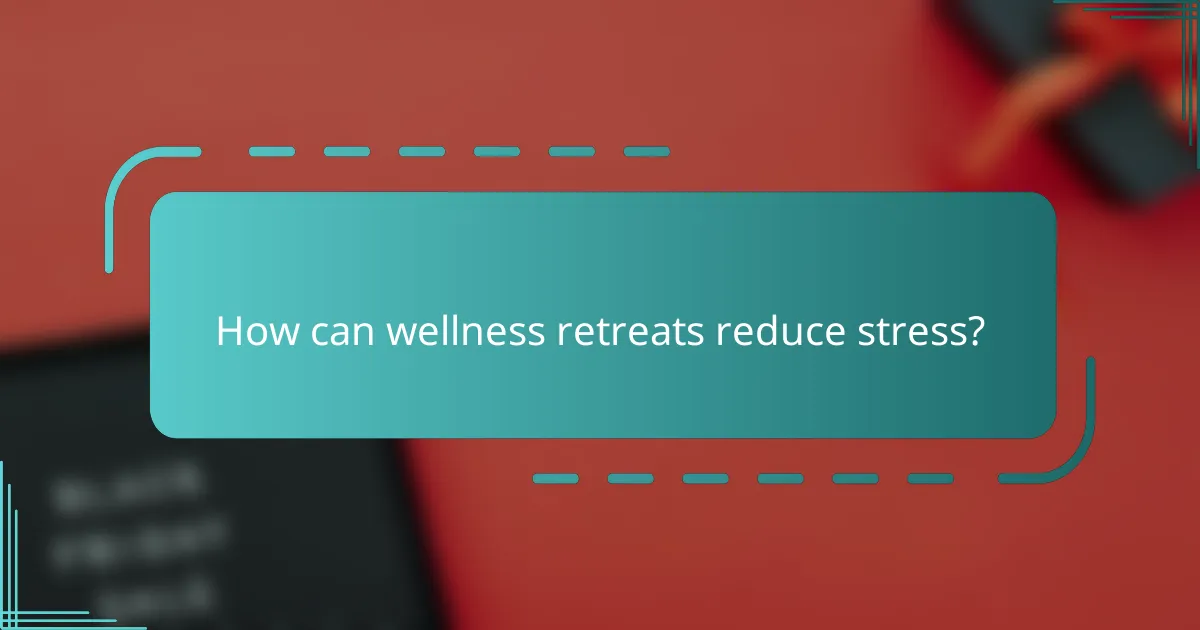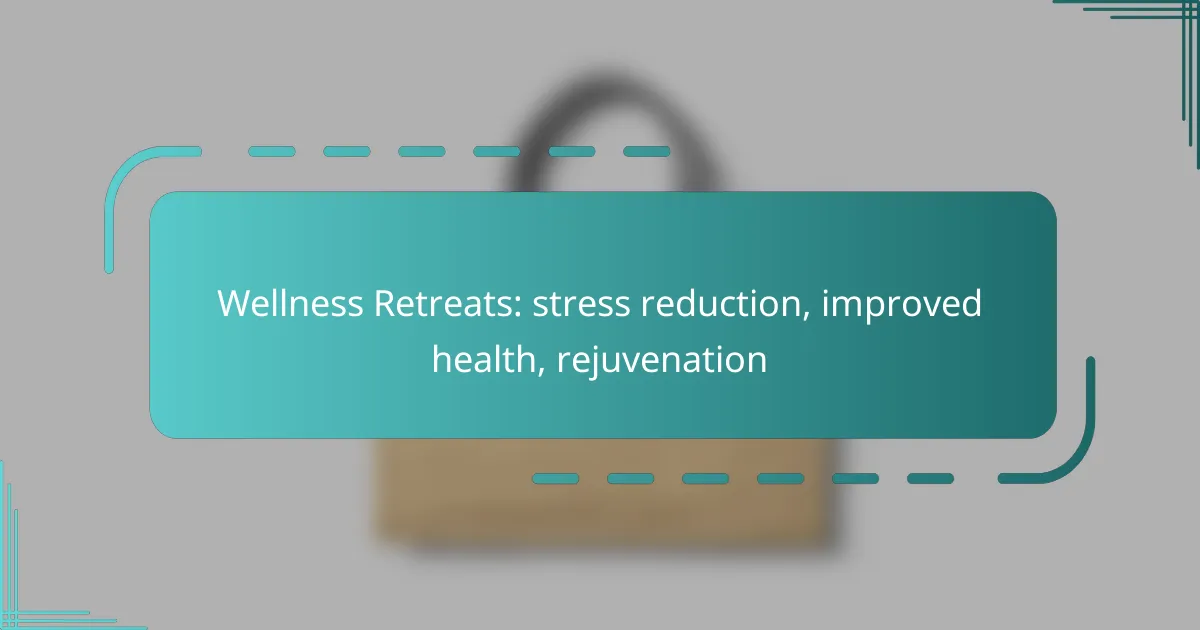Wellness retreats provide a transformative escape designed to reduce stress and enhance overall health. By immersing participants in a serene environment, these retreats focus on holistic well-being through activities such as yoga, meditation, and personalized therapies, promoting rejuvenation and mental clarity.

How can wellness retreats reduce stress?
Wellness retreats can significantly reduce stress by providing a structured environment focused on relaxation and self-care. These retreats often combine various techniques aimed at promoting mental clarity, emotional balance, and physical rejuvenation.
Meditation and mindfulness practices
Meditation and mindfulness practices are central to many wellness retreats, helping participants cultivate present-moment awareness and reduce anxiety. Techniques may include guided meditations, breathwork, and mindfulness exercises that encourage participants to observe their thoughts without judgment.
To maximize benefits, consider dedicating at least 10-20 minutes daily to these practices during your retreat. This consistent engagement can lead to improved emotional regulation and a greater sense of calm.
Nature immersion and outdoor activities
Nature immersion plays a vital role in stress reduction at wellness retreats. Activities such as hiking, yoga in natural settings, or simply spending time outdoors can enhance mood and promote relaxation. Research suggests that being in nature can lower cortisol levels, a primary stress hormone.
Look for retreats that offer a variety of outdoor activities, allowing you to connect with the environment. Aim for experiences that encourage physical movement, as even gentle activities can significantly boost your mental well-being.
Therapeutic spa treatments
Therapeutic spa treatments are often integral to wellness retreats, providing physical relaxation and mental rejuvenation. Services like massages, facials, and hydrotherapy can alleviate muscle tension and promote a sense of well-being.
When selecting treatments, consider your personal preferences and any specific stress-related issues you want to address. Many retreats offer packages that combine multiple treatments, which can enhance overall relaxation and effectiveness.
Group support and community
Group support and community are essential elements of wellness retreats, fostering connections among participants that can enhance the healing process. Sharing experiences and challenges in a supportive environment can help individuals feel less isolated in their stress.
Engage actively in group activities and discussions, as these interactions can provide valuable insights and encouragement. Look for retreats that emphasize community-building through shared meals, workshops, or group exercises, as these can deepen your sense of belonging and support.

What are the health benefits of wellness retreats?
Wellness retreats offer a range of health benefits, including stress reduction, improved physical health, and rejuvenation. These retreats provide an opportunity to disconnect from daily life and focus on holistic well-being through various activities and therapies.
Improved mental health
Wellness retreats can significantly enhance mental health by providing a serene environment that fosters relaxation and mindfulness. Participants often engage in practices such as meditation, yoga, and counseling, which can reduce anxiety and depression.
Taking time away from everyday stressors allows individuals to gain perspective and develop coping strategies. Many retreats also incorporate group activities that promote social connections, further supporting emotional well-being.
Enhanced physical fitness
Physical fitness is a key component of wellness retreats, which often include structured exercise programs tailored to various fitness levels. Activities may range from hiking and swimming to yoga and strength training, encouraging participants to stay active.
Regular physical activity during these retreats can lead to improved cardiovascular health, increased strength, and better overall fitness. Many retreats also provide personalized fitness assessments to help guests set achievable health goals.
Better sleep quality
Attending a wellness retreat can lead to improved sleep quality by promoting relaxation and establishing healthy sleep habits. The tranquil environment and reduced screen time help participants unwind, making it easier to fall asleep and stay asleep.
Many retreats offer workshops on sleep hygiene, teaching techniques such as maintaining a consistent sleep schedule and creating a restful environment. Implementing these strategies can lead to long-term improvements in sleep patterns.
Detoxification and nutrition
Detoxification and nutrition are often central themes at wellness retreats, where participants learn about healthy eating and cleansing practices. Many programs include meal plans focused on whole foods, fresh fruits, and vegetables, which support the body’s natural detox processes.
Some retreats may also offer detox programs that involve fasting or juice cleanses, although these should be approached with caution and ideally under professional guidance. Understanding nutritional needs and making informed choices can lead to lasting health benefits beyond the retreat.

Which wellness retreats are popular in the United States?
Popular wellness retreats in the United States focus on stress reduction, improved health, and rejuvenation. These retreats offer a variety of programs, from yoga and meditation to spa treatments and nutrition workshops, catering to diverse needs and preferences.
Miraval Arizona Resort & Spa
Miraval Arizona Resort & Spa, located in Tucson, is renowned for its holistic approach to wellness. Guests can engage in activities like mindfulness meditation, equine therapy, and outdoor adventures, all designed to promote relaxation and self-discovery.
The resort emphasizes a balanced lifestyle, offering nutritious meals crafted from local ingredients. With a range of spa services, including massages and facials, visitors can rejuvenate both body and mind in a serene desert setting.
Canyon Ranch in Lenox
Canyon Ranch in Lenox, Massachusetts, combines luxury with wellness through personalized programs. Guests can choose from fitness classes, wellness consultations, and spa treatments tailored to their individual health goals.
This retreat also features a focus on nutrition, offering cooking classes and healthy dining options. The tranquil environment, surrounded by nature, enhances the overall experience, making it a popular choice for those seeking rejuvenation.
Cal-a-Vie Health Spa
Cal-a-Vie Health Spa in San Diego, California, is known for its intimate setting and comprehensive wellness offerings. The retreat provides a blend of fitness activities, spa treatments, and educational workshops aimed at fostering a healthier lifestyle.
With a focus on personalized attention, guests can expect customized programs that include fitness assessments and nutritional guidance. The picturesque surroundings and luxurious accommodations contribute to a truly restorative experience.
Red Mountain Resort
Red Mountain Resort in Ivins, Utah, offers a unique blend of adventure and wellness. Set against stunning red rock landscapes, this retreat provides outdoor activities like hiking and mountain biking, paired with wellness programs focused on stress reduction and health improvement.
Guests can participate in cooking classes, yoga sessions, and spa treatments, all designed to enhance physical and mental well-being. The resort’s emphasis on nature and exploration makes it an ideal choice for those looking to rejuvenate in a beautiful setting.

What should you consider when choosing a wellness retreat?
When selecting a wellness retreat, consider factors such as location, program types, costs, and accommodations. These elements significantly impact your overall experience and effectiveness in achieving stress reduction, improved health, and rejuvenation.
Location and accessibility
The location of a wellness retreat plays a crucial role in your experience. Look for retreats that are easily accessible, whether by car or public transport, to minimize travel stress. Popular regions often include serene natural settings, such as mountains or beaches, which enhance relaxation.
Consider the climate and season as well. A retreat in a warm, sunny area may be preferable during colder months, while a cooler climate might be ideal for summer escapes.
Types of programs offered
Wellness retreats typically offer a variety of programs focusing on different aspects of health, including yoga, meditation, nutrition, and holistic therapies. Determine what aligns with your wellness goals; for instance, if stress reduction is your priority, look for retreats that emphasize mindfulness and relaxation techniques.
Some retreats may also offer specialized programs, such as detoxification or fitness boot camps. Review the schedule and see if the activities resonate with your interests and needs.
Cost and duration
Costs for wellness retreats can vary widely, often ranging from a few hundred to several thousand dollars depending on the location, duration, and amenities included. Set a budget before you start looking, as this will help narrow down your options.
Duration is another key factor. Most retreats last from a weekend to a week or more. Consider how much time you can dedicate to the retreat, as longer stays may offer deeper benefits but require more commitment.
Accommodations and amenities
Evaluate the accommodations and amenities provided at the retreat. Comfortable lodging can significantly enhance your experience, so look for options that offer private or shared rooms, depending on your preference. Check for additional amenities like spas, pools, or fitness facilities that can contribute to your relaxation and rejuvenation.
Also, consider the dining options available. Healthy, nutritious meals are often a key component of wellness retreats, so ensure that the retreat offers meals that cater to your dietary preferences or restrictions.
